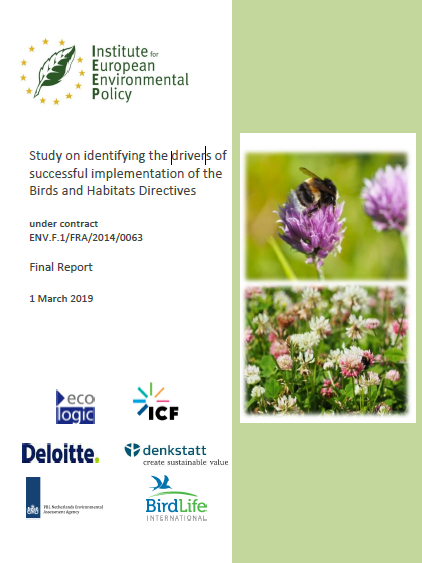The EU project "Drivers for successful Nature Directive implementation" responds to the gap revealed by the Nature Directives Fitness Check, by identifying measure driven improvements that lead to a better conservation status of species and habitats, and thus support the Commission's improved implementation strategy of the Nature Directives. The project is lead by the Institute for European Environmental Policy (IEEP) and is supported by Ecologic Institute and four other consortium members.
Background
The Fitness Check of the Birds and Habitats Directives revealed that progress was made towards achieving the Nature Directives' specific objectives. However, it also identified significant gaps to meet their overarching aims. In particular, the management of Natura 2000 sites is lagging behind in progress, as the measures taken to-date are not yet sufficient to achieve or maintain a favourable conservation status for a substantial proportion of species and habitats.
Despite still prevailing negative trends, there are some remarkable recoveries in conservation status of the species and habitat types of community interest as well as population size and trends of bird species. In general though, reporting on Article 17 and 12 contributes little contextual explanation for the reason behind certain habitats and species showing more positive trends than others, as well as the key drivers for these positive trends or recoveries. Nevertheless, there is some evidence that a significant share of the positive trends and recoveries of habitats and species can be attributed to targeted conservation measures that were implemented in the Member States.
Main objectives
The principle objectives of the project are:
- to provide a compilation of all genuine improvements that Member States have reported with regard to positive trends of individual habitat types or species of EU conservation concern, and
- to identify the main success factors explaining these improvements - the "drivers of success".
For this reason, a comprehensive database covering all improvements reported in the national and EU reports under Article 17 and 12 will be created, providing a list of drivers for each of them. On this basis, 75 case studies will be selected and carried out. The study will, on the basis of the key drivers of success, provide "lessons learnt" and recommendations for the Commission and for Member State authorities to enhance and up-scale implementation of the Nature Directives, and to improve the accompanying reporting and monitoring processes. The results are crucial to support the Commission's improved implementation strategy, particularly identifying and focusing on those approaches, where support from the Commission and the Member States is most likely to deliver sustainable improvements.
Ecologic's role
Within this project, Ecologic Institute leads the activities related to the establishment of a data-base of all genuine improvements that Member States have reported, its population and data analysis. Furthermore, it contributes to statistical analysis of factors affecting improvements, to a large number of case studies and contributes to the final recommendations.




